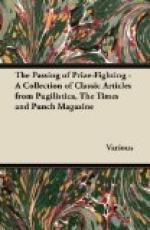Richard. You have often talked about people going into sanctuary. What does it mean?
Mrs. M. Originally every church, abbey, or consecrated place was a sanctuary, and all persons who had committed crimes or were otherwise in fear of their lives might secure themselves from danger by getting into them. But in the reign which we have been discussing it came to be used specially of the House of Commons from the number of tiresome and objectionable people who sought refuge there, because of the freedom from legal penalties which they enjoyed. Once safe in the House of Commons they said and even did things which, if they had been said or done in public, or even in private, would have exposed them either to prosecution or personal chastisement. Ultimately the nuisance became so great that the privilege of sanctuary was abolished, and the tone of the House of Commons greatly improved.
Mary. I could not quite understand that story about the King and the public jester.
Mrs. M. In earlier reigns it was customary for kings and nobles to have in their retinue some one whose business it was to play the fool, and who was privileged to say or do anything that was ridiculous for the sake of diverting his master. Although this practice had died out the privilege was usurped by a certain number of writers and speakers, who sought to attain notoriety by making themselves as unpleasant or ridiculous as possible on every occasion. It requires some cleverness to be a great fool, and though some of these public buffoons were clever men the majority had more malice than wit, and in time exhausted the patience of the people. Finally, in order to protect them from the violence of the infuriated populace, the Government were obliged to deport the chief offenders to the Solomon Islands, where cannibalism then prevailed.
George. Did they play on anything else besides mouth-organs in those days?
Mrs. M. They had many curious musical instruments which are now entirely obsolete. Of these the most popular was the pianoforte, a large wooden box with a long horizontal keyboard, which the player struck with his fingers. Considerable and sometimes even distressing dexterity was attained by the performers, who indulged in all sorts of strange antics and gestures. The exercise was found to be remarkably beneficial to the growth of the hair, but it had compensating disadvantages, leading to cramps, dislocations and other troubles. Ultimately pianoforte playing was suppressed, largely owing to the exertions of the Society for the Prevention of Cruelty to Elephants, the tusks of that animal being in great request for the manufacture of the keys.
Richard. I shall never go to the Zoological Gardens without rejoicing over the suppression of the pianoforte.
Mrs. M. Another favourite instrument was the violin, a small and curiously shaped apparatus fitted with four strings, which, when rubbed or scraped with horsehair tightly stretched on a narrow wooden frame, were made to produce sounds imitating the cries of various animals, especially the mewing of a cat, to perfection. But as the timbre of the instrument did not lend itself to successful mechanical reproduction by the gramophone it fell into disuse.




